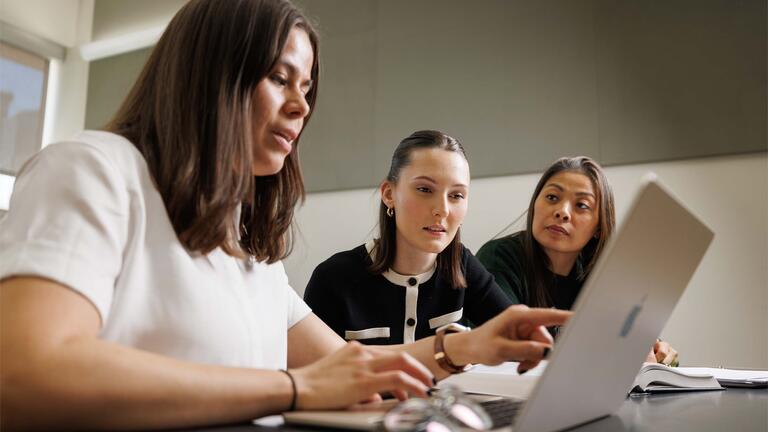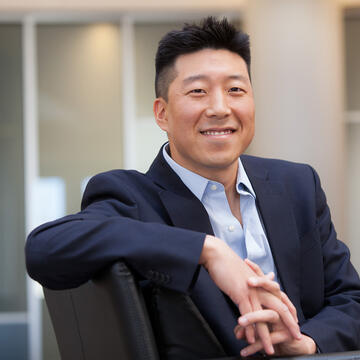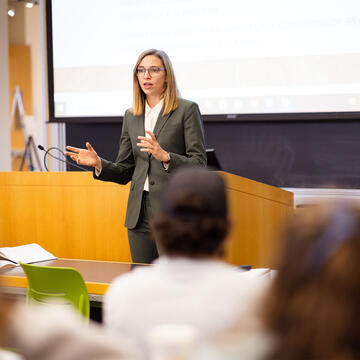
Legal Research, Writing & Analysis
USF's rigorous and comprehensive Legal Research, Writing, and Analysis (LRWA) program prepares students to meet the demands of today’s legal careers. With generative AI (GenAI) integrated into the first-year curriculum, you’ll learn to think, write, and advocate like practicing attorneys.
You’ll finish your first year as a well-trained researcher, thinker, writer, and advocate — ready to meet the demands of externships, summer jobs, and legal careers.
Learn from Legal Experts
USF's legal writing faculty are seasoned practitioners and experienced teachers. Their practice backgrounds range from private firms to public agencies and nonprofit organizations. They maintain a deep commitment to individualized learning, which results in a student-teacher bond that endures well past the first year of law school.
Connect with Judges
The LRWA program also hosts an annual panel of local judges who talk with students about their expectations in the courtroom and on briefs. This access to judges gives students a unique opportunity to learn more about the importance of professionalism and how to be a better advocate. Members of the state and federal trial and appellate benches who have consistently attended this event include Judge Saundra B. Armstrong, Judge Maria-Elena James, Justice Martin Jenkins, Judge Curtis Karnow, Justice James Lambden, Justice James Richmond, Judge Mary Wiss, and Judge Garrett Wong.
Use AI with Confidence
You will learn to:
- Use AI in legal analysis and evaluate AI-generated legal content, focusing on efficiency while critically evaluating its output for errors in reasoning, accuracy, clarity, and structure.
- Use iterative prompting to revise and improve AI outputs, building stronger arguments and more effective legal writing.
- Accelerate legal research by augmenting traditional methods using a variety of legal AI platforms.
- Confront ethical issues, including confidentiality, bias, and the responsible use of emerging tech tools.
Curriculum
All first-year students are required to take part in the law school's demanding six-credit LRWA program. The work is rigorous, but the small class size (approximately 20 students) fosters collaboration and allows faculty to adapt instruction to particular classroom needs and provide individualized feedback. There are numerous assignments, which give students the opportunity to practice their writing extensively. Throughout the year, legal writing faculty partner with USF's reference law librarians to co-teach legal research.
Fall Semester
In the fall, students focus on predictive legal analysis and writing. They learn about the structure of the court system and about the weight of authority. They develop strong analytical skills to identify the legal issues, develop the relevant law, apply the law to the facts, and render a conclusion. They develop large-scale and small-scale organizational skills. They practice these skills throughout the semester using the inter-office memo format, which provides students with an understanding of the component parts of legal analysis. This enables them to cultivate their judgment and discernment for any given writing assignment based on the expectations of a particular project or supervisor. During the fall, students are also introduced to digital and print research and learn about the proper use and formatting of citations using the Bluebook.
Spring Semester
USF Hosted the First Annual Western Regional Legal Writing Conference, "How to Hit the Ground Writing: Meeting the Expectations of the Changing Legal Market."
In the spring, students focus on legal research, persuasive writing, and oral advocacy. They expand their knowledge of the library's print resources and the various platforms of commercial online legal research. They also learn about low-cost and free research resources, which are imperative given the rising costs of law practice. They learn and practice research strategies using complex legal problems. They learn and practice the art of persuasion in the context of a trial court memorandum of points and authorities. Importantly, they also learn the value of good editing and proofreading skills.
After students submit their major points and authorities writing assignment, they learn and practice their oral advocacy skills to prepare for their first oral argument. The students are coached by their legal writing professor and an upper-division law student. The program culminates in a moot court event in April, where local judges and attorneys-many of them USF School of Law graduates-act as judges during oral arguments. USF students consistently receive positive feedback during this event about their level of preparedness, their knowledge of the law, their facility with the facts, and their ability to present cogent and persuasive arguments on behalf of their client.
Alumni Perspectives
Legal Research, Writing, and Analysis was my first foray into the actual work of attorneys. After a year of the course, my thought processes and outlook had changed how I looked at problems and I was extremely prepared to perform in my summer internship."
Cooper Findlay ’16
Clear legal writing is critical in eviction defense cases, where we work with an extremely diverse client base - and a local trial court that often lacks housing law expertise. Any legal writing we do at the Eviction Defense Collaborative must be able to reach both of these audiences - the tenants for whom we are preparing their legal papers, and the judges who will rule on those papers. The emphasis at the USF Legal Research, Writing, and Analysis Program on clear, convincing prose gives USF law students in our office a better chance to contribute meaningfully to the defense of their clients' home. By coming to us with solid, well-practiced writing skills, our USF law student volunteers are well prepared to help us fight homelessness and protect the diversity of San Francisco."
Tyler MacMillan ’06 Executive Director, Eviction Defense Collaborative
Our recent experience is that the law students trained as part of USF’s Legal Writing Program are best equipped to intelligently and directly write about complex legal issues. There can be no question that writing is our bread and butter, whether letters to opposing counsel, research memos or briefs to the court, writing makes up large chunks of a litigator’s day. We have been very impressed with the overall quality of the written work of USF students. This allows us to provide bigger and better assignments during the summer associate experience. It’s a win-win. There was a palpable level of maturity in the writing of the summer associates from USF. We will definitely look to hire other USF candidates in the future because of the training they get in law school.”
Lawrence Goldberg ’93 & Ethan Friedman ’00 Partners at Bowles & Verna, LLP, Walnut Creek, California, Summer Associate Program Mentors

